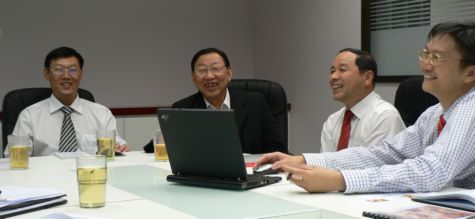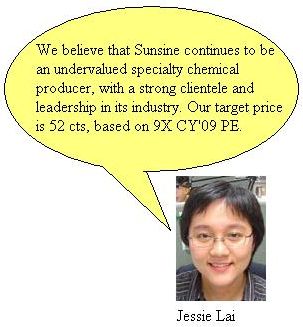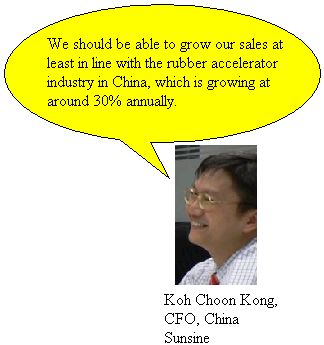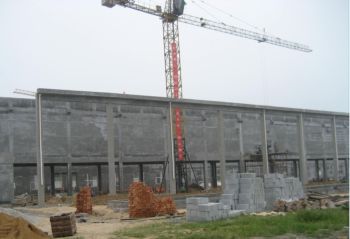 Key management: China Sunsine chairman Xu Cheng Qiu (second from left), and CFO Koh Choon Kong, a Singaporean (extreme right). Picture by Leong Chan Teik
Key management: China Sunsine chairman Xu Cheng Qiu (second from left), and CFO Koh Choon Kong, a Singaporean (extreme right). Picture by Leong Chan Teik
IT HAS been six months since China Sunsine listed on the mainboard of the Singapore Exchange in July ’07.
The stock has not been sizzling (30 cents recently versus IPO price of 39 cents) but the business has achieved milestone after milestone recently.
One of these was in December last year when Sunsine (not to be confused with Sunshine Holdings, a pure property stock) clinched a new customer, Continental AG of Germany, the world’s 4th largest tyre manufacturer.
Continental had conducted an accreditation process of Sunsine before placing trial orders for the chemicals it needed to produce rubber tyres and rubber products.
The trial orders for "rubber accelerators" are for use by Continental’s Malaysian and South African plants. After trying out the product, it is expected to place sales orders next year.
The potential demand by the two Continental plants is 1,100 tonnes, based on estimates that tyre manufacturing requires 1.7 tonnes of rubber accelerators for every 100 tonnes of rubber used.
Sunsine currently has a production capacity of 39,000 tonnes, which is fully utilised.
The deal with Continental was especially significant because Continental completes the list of the world’s top 10 tyre manufacturers who are Sunsine’s clients.
The other 9 are listed below, and they accounted for 30.1 % of Sunsine’s sales in the first half of 2007.
| Top 10 world tyre manufacturers (China Sunsine’s clients) |
| Bridgestone |
| Michelin |
| Goodyear |
| Continental AG |
| Pirelli |
| Sumitomo |
| Yokohama Rubber |
| Hankook Rubber |
| Cooper Tire |
| Kumho Tires |
The blue-blooded clientele is one thing that analyst Jessie Lai of CIMB-GK noted in a Jan 7 ’08 report:
“We believe that Sunsine continues to be an undervalued specialty chemical producer, with a strong clientele and leadership in its industry.”
Jessie, who is the only one covering the stock currently, has a target price of 52 cents. At 31 cents, the stock is trading at her estimate of 5.4X CY 09 PE.
Her target price is based on 9x CY09 P/E, which is in line with the valuation of international peers LANXESS Corporation and Chemtura Corporation.
However, LANXESS and Chemtura have far bigger market capitalization of US$4 billion and US$1.7 billion, respectively, than Sunsine (US$100 million), and accelerators constitute a small portion of their business.
Higher orders
Even as Continental was pursuing its accreditation process, two of Sunsine’s existing clients were placing maiden orders for their plants outside of the Asia Pacific region.
In November ‘07, Sunsine announced that it would expand its service coverage to Pirelli Tyres (world No. 5 tyre manufacturer) to include its Brazil and Turkey operations. These are trial orders.
In the same month, Sunsine announced that it would supply Michelin (world No. 2 tyre manufacturer) with an additional high-volume product, the rubber accelerator CBS.

Global tyre manufacturers aside, Sunsine counts eight of China’s top 10 tyre manufacturers among its clients. In all, Sunsine has over 400 clients in more than 30 nations across six continents.
To cater to growing demand, Sunsine - which was already operating at full capacity - expanded its capacity from 32,000 tonnes to 39,000 tonnes in Q4 of last year.
This makes up for a delay in the completion of new integrated accelerators workshop, and was necessary due to  Sunsine’s track record of high growth in its sales volume.
Sunsine’s track record of high growth in its sales volume.
Capacity will hit 49,000 tonnes by the middle of this year once the integrated workshop is online. Coupled with the introduction of 2 new products - ie, insoluble sulphur and anti-oxidant TMQ - Sunsine’s total production capacity will reach 62,000 tonnes by the end of this year.
The funds for expansion will come from the S$46.8 million raised from the sale of new shares during its IPO.
With a bigger production capacity, Sunsine could overtake LANXESS of Germany, which currently produces 45,000 tonnes a year, to become the largest producer of rubber accelerators in the world.
This will help meet soaring demand from China which is seeing a jump in investments in tyre-manufacturing facilities by global players. In 2005 alone:
* Michelin announced investments to make its Shanghai factory the biggest tyre plant in the world;
* Bridgestone announced plans to be the biggest manufacturer in China;
* Bridgestone will open new plants in Wuxi, Shenyang, and Huizhou and expandTianjin plant;
* Goodyear moved its Asiapac HQ to Shanghai and doubled Dalian production from 2 million to 5.25 million units
And as its production capacity expands, Sunsine will target markets beyond Asia Pacific where it has not entered aggressively into because of capacity constraints.

Improving profit margins
The past six months of being a listed company have provided some lessons to Sunsine on meeting the expectations of public shareholders.
Traditionally, the company has placed the highest priority on growing its sales. But following the IPO, shareholders and analysts gave feedback to the management that the market placed great emphasis on profit margins and profits too.
And they were concerned with what appeared to be shrinking margins.
In Q3 of 2007, for example, the gross margin had declined to 18.7 % from 21.9 % in the first half of 2007.  Sunsine is pursuing global market share, and looking for potential acquisitions.
Sunsine is pursuing global market share, and looking for potential acquisitions.
Photo by Victor Ng.Sunsine attributed the decline partly to a fall in government export tax rebates from 13% to 5% from July 2007 onwards (industry-wide adjustment as a result of government policy).
In addition, Sunsine experienced a shortage of internally-produced MBT, an intermediate product for the production of rubber accelerators.
The shortage was caused by sales volume increasing, year-on-year, in the past two quarters by an average of 35% each in Q2 and Q3.
As a result of the shortage, Sunsine had to buy MBT from external sources at a higher price.
To address investors’ expectations, Sunsine negotiated with its overseas clients to increase average selling prices by 6% to compensate for the decrease in the export tax rebate.
Otherwise, the margin decline in 3Q would have been worse as about half of Sunsine's sales were from exports.
Then in December 07, Sunsine increased its MBT production by 7,000 tonnes per annum to reduce its purchase of MBT from external sources.
The in-house MBT could cost Rmb2,000/tonne less than external MBT. As a result, accelerator gross margins in FY08-09 could rise by 1-2 percentage points, going by CIMB-GK estimates.
Sunsine has indicated that it will continue to pursue a bigger global market share of accelerators, introduce new products to existing clients, and look for potential acquisitions that may have synergistic value.
China Sunsine’s website: www.chinasunsine.com






